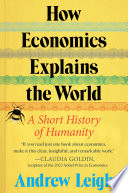

Incentives are fundamental to understanding economic behavior. They drive individuals and organizations to make choices that can lead to various outcomes. The book emphasizes how both positive and negative incentives influence decision-making. For example, financial rewards can motivate employees to perform better, while penalties can deter undesirable actions. The author illustrates this with real-world examples, such as how tax incentives can encourage businesses to invest in certain areas. Understanding incentives helps decode the complexities of human behavior in economic contexts, offering insights into policy-making and business strategies.
Continue readingThe book discusses how markets function and the concept of efficiency. It explains that markets are typically efficient in allocating resources when they operate under competitive conditions. However, various factors like monopolies, externalities, and information asymmetries can disrupt this efficiency. The author delves into different market structures and their implications for economic outcomes. By understanding how markets work, readers can appreciate the importance of competition and regulation in fostering a healthy economy, as well as the potential pitfalls of market failures.
Continue readingSupply and demand are the cornerstones of economic theory and are crucial for understanding price formation. The book elaborates on how shifts in supply or demand can lead to changes in market equilibrium and subsequently affect prices. It provides examples from various industries to illustrate how external factors, such as technological advancements or changes in consumer preferences, can shift supply and demand curves. Grasping these concepts equips readers with the analytical tools to interpret market trends and make informed decisions in business and investment.
Continue readingThe book introduces behavioral economics, which combines insights from psychology with economic theory to explain why people often make irrational decisions. It highlights common cognitive biases that can lead to suboptimal choices, such as overconfidence or loss aversion. By understanding these biases, individuals can better navigate their decision-making processes, whether in personal finance, investing, or business strategies. The author argues that recognizing the psychological factors at play can lead to more effective policies and business practices that align with actual human behavior.
Continue readingGlobalization has reshaped economies worldwide, and the book explores its implications. It discusses how interconnected markets can lead to both opportunities and challenges. The author examines trade agreements, outsourcing, and the flow of capital across borders, emphasizing the benefits of comparative advantage. However, it also addresses the risks of economic dependency and the impact of global crises. Understanding globalization helps readers appreciate the complexities of international economics and the importance of strategic decision-making in a global context.
Continue readingGovernments play a crucial role in shaping economic outcomes through regulation, taxation, and public goods provision. The book discusses the balance between free markets and government intervention, exploring when and how government action is necessary to correct market failures. It provides historical examples of successful and unsuccessful interventions, highlighting the importance of sound economic policy. Readers gain insights into the debate over the size and role of government, equipping them to engage in discussions about fiscal policy and regulation.
Continue readingThe final key idea focuses on the factors that contribute to economic growth and development. The book outlines the significance of human capital, innovation, and infrastructure in fostering economic progress. It discusses various models of economic development and the challenges faced by developing nations. By understanding the drivers of growth, readers can better appreciate the complexities of economic progress and the policies that can promote sustainable development. This knowledge is particularly relevant for those interested in international development and economic policy.
Continue readingThe reading time for How Economics Explains the World depends on the reader's pace. However, this concise book summary covers the 7 key ideas from How Economics Explains the World, allowing you to quickly understand the main concepts, insights, and practical applications in around 24 min.
How Economics Explains the World is definitely worth reading. The book covers essential topics including The Role of Incentives, Market Mechanisms and Efficiency, The Importance of Supply and Demand, providing practical insights and actionable advice. Whether you read the full book or our concise summary, How Economics Explains the World delivers valuable knowledge that can help you improve your understanding and apply these concepts in your personal or professional life.
How Economics Explains the World was written by Andrew Leigh.
If you enjoyed How Economics Explains the World by Andrew Leigh and want to explore similar topics or deepen your understanding, we highly recommend these related book summaries:
These books cover related themes, complementary concepts, and will help you build upon the knowledge gained from How Economics Explains the World. Each of these summaries provides concise insights that can further enhance your understanding and practical application of the ideas presented in How Economics Explains the World.